This crisis is rooted in Washington’s obsession with Russia, writes Michael Brenner. The country’s Phoenix-like rise from the ashes has been unsettling to politicos, policy-makers and think tankers alike.

Kiev, 2015. (Bert Kaufmann, Flickr, CC BY-NC 2.0)
 American behavior in the year-long Ukraine crises has been bizarre – even by Washington standards. It flared in April without any apparent catalyst. Rhetoric and action only tenuously related. Each erratic with quick shifts in tone and evident intent. One day belligerent, the next mollifying. The fire seemed banked at one moment only to burst into a menacing blaze the next. All spiced with large infusions of Orwellian language that would make George himself blush.
American behavior in the year-long Ukraine crises has been bizarre – even by Washington standards. It flared in April without any apparent catalyst. Rhetoric and action only tenuously related. Each erratic with quick shifts in tone and evident intent. One day belligerent, the next mollifying. The fire seemed banked at one moment only to burst into a menacing blaze the next. All spiced with large infusions of Orwellian language that would make George himself blush.
Baffling questions leave us perplexed. That is many foreign governments (now including the one in Kiev), their confused populaces and analysts who struggle to find the thread of logic that runs through this crazy-quilt affair. Can you hold a war if the other side doesn’t show up? Are we being treating to an extreme exercise in psychological “projection?”
After all, Russian leaders have declared, to their own people as well as other governments, that they have no intention or reason to invade Ukraine. Indeed, the present crisis atmosphere originated in Ukraine’s move of large forces to the contact line with the Donbass accompanied by bellicose oratory. The Kremlin’s consistent position since last March and April has been that that any attack would be intolerable, to be met with active resistance on their part.
Are we seeing a “parthenogenetic” conflict/war/crisis? A first – to my recollection. A geo-strategic Virgin birth? A reminder that there are more things under the Heavens than in our theories?
Then, we have the juxtaposition of war hysteria sweeping the country – our political elites, anyway, on the one hand and, on the other, an empty arsenal. All parties know that the U.S., its allies and the Ukrainian army couldn’t defend against a hypothetical Russian advance for more than a few days, at which time the Kremlin would dictate terms to a truncated Ukrainian virtual state.
There is much chest-thumping talk of imposing the “Mother of all sanctions” on Russia even as evidence mounts that the measures highlighted would hit Western Europe harder than Russia – a Russia that has been assiduously erecting its defenses since 2015 when the then “devastating sanctions package” were put in place.
In a comic coda, U.S. President Joe Biden last week unveiled his ultimate secret weapon: customized sanctions against Russian President Vladimir Putin personally – perhaps, a lifetime ban on visiting Disneyland among other telling blows. Blacklisted! Sleepless nights ahead?
Background & Context
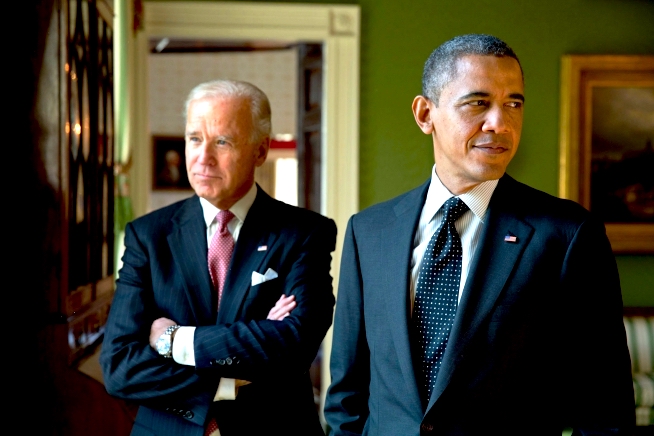
Then Vice President Joe Biden, left, with President Barack Obama. (White House/Pete Souza)
Much of what the United States does in the global arena these days is simply silly – when it is not harmful. We could chalk up the entire Ukraine crisis II to a bout of silliness induced by the heady experience of the head of state actually sitting in the Oval Office after striving for 33 years to get there.
On reflection, though, I believe that there is in fact a certain strategic logic behind American behavior – however primitive it might be. It’s been staring us in the face for the past 10 months, we’ve seen the signs, but the inductive conclusion somehow has eluded most of us. To put it simply: the crisis is rooted in Washington’s obsession with Russia. It has very little to do with Ukraine per se. That benighted country has provided the occasion, not the cause.
For the past 30 years, the denaturing of Russia as a significant power on the European scene (much less the global scene) has been a bedrock objective of American foreign policy. The country’s Phoenix-like rise from the ashes has been unsettling to Washington – politicos, policy-makers, think tankers alike. Even the far more menacing threat to the United States’ hegemony posed by China has not cooled the ardor of the pervasive, and passionate, Russophobia. The sources of that phobia are multiple and varied. Their examination is the proper subject of a separate essay.
Objectively speaking, the United States is more secure from external danger than at any time since before World War I. It has no enemies capable or desirable of using military force against either national territory or its core interests abroad. China is not an avatar of Imperial Japan and poses quite a different order of challenge. Putin’s Russia is not an avatar of the Soviet Union in ideological terms or great-power terms. Its defense of its national interests and dedication to securing its place as a significant player on the world stage is what big countries always have done.
Russia has rebelled against the American strategy of isolating it, diminishing it and denying it any influence in areas of traditional concern: Ukraine, the Caucasus, Central Asia and parts of the Near East. Washington finds that intolerable. Hence, the inflation of Russian behavior in Ukraine (where Washington organized a coup against a democratically elected government because we disliked its political complexion) and Syria (where Russia’s intervention is at the request of the established government while the U.S. commitment to occupying parts of it has no legal basis).
The situational logic of the emerging international constellation of forces pointed to two possible American strategies. The most obvious would aim at preventing the solidification of an alliance between Russia and China. Together, they represent a formidable bloc now capable of challenging the U.S.-led Western bloc in just about every sphere. Its steady strengthening means that time is on their side – crudely put.
Such an approach carried in its train the judgment that cultivating tolerably cordial relations with Moscow was an imperative. That is the strategic logic that President Richard Nixon and his National Security Advisor Henry Kissinger followed in 1972 when they went to Beijing to bury the hatchet with Mao Zedong – a far more daring initiative with a far less compatible party.
That idea has floated around policy circles for a while, but it never gained traction among the movers-and-shakers of the Washington-New York Establishment. We do not know if it had an advocate within the nascent Biden administration. If it did exist, that person or persons were not to be found in charge at the State Department, at the Pentagon, at the National Security Council, at the C.I.A. or in the White House proper.
The alternative strategy was to ratchet up pressure on Russia so as to nip in the bud Moscow’s aspiration to become once again a major player – one dedicated to denying the United States its privileges as global hegemon and sole master of Europe.
The driving force came from the ardent Victoria Nuland, under secretary of state for political affairs, and her neo-con comrades ensconced in the power agencies, in Congress and in the MSM. Since Antony Blinken, U.S. secretary of state, and Jake Sullivan, national security adviser, were themselves partisans of this confrontational strategy, the outcome of whatever modicum of debate occurred was preordained.
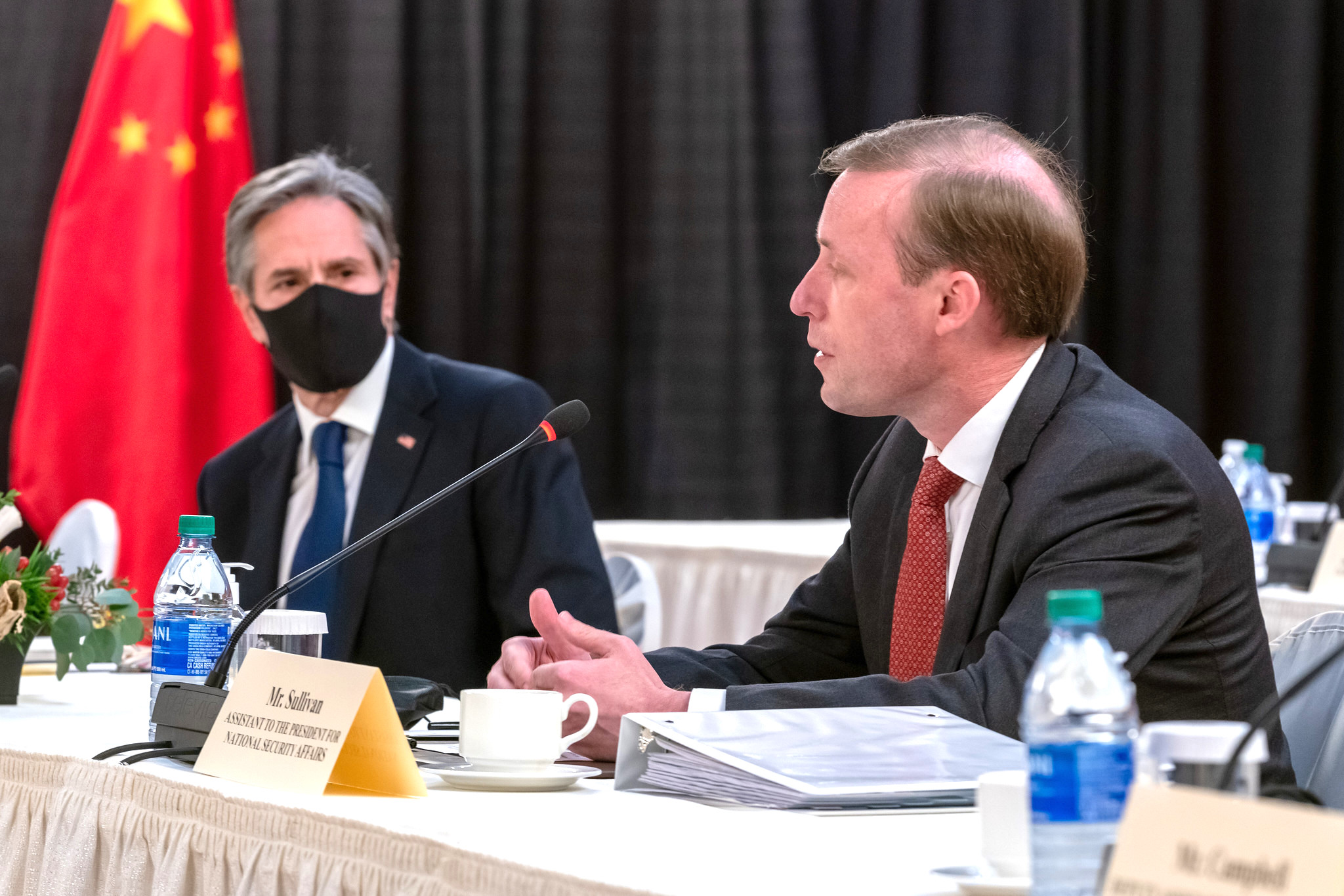
U.S. Secretary of State Antony Blinken, left, and National Security Advisor Jake Sullivan in March 2021. (State Department, Ron Przysucha)
By the end of March, Ukraine became the focal center for the strategy. Let’s recall, that Joe Biden had been former President Barack Obama’s man in Kiev after the 2014 coup. He directly oversaw the program for creating a pro-Western ally, tied to the United States (preferably via membership in NATO – as first proposed by President George W. Bush in 2008) and to the European Union with its economy disengaged from Russia’s. He travelled to Kiev frequently and reportedly was on the phone with President Petro Poroshenko at least once a week.
Since the Maidan coup, Ukraine has experienced political turmoil – now under accidental President Vladimir Zelensky, the former comedian who became a public figure by mocking impersonations of then President Poroshenko. Running on a platform that promised an attempt at reconciliation with Russia (winning him the vote in the Donbass and other Russian-speaking regions), he had been firmly brought into line by the menacing ultra-nationalists and neo-fascists, the security establishment and Washington.
The economy was a shambles; living standards and GDP has never even reached the 1991 level. Exactly how this domestic state-of-affairs played into Kiev’s readiness to join the United States in a scheme to provoke a fresh crisis along the contact line with the Donbass is unclear.
We can be sure, though, that people like Nuland – of Maidan Square cookie fame – were pressing the buttons in both Washington and Kiev. Moreover, we know with certainty that Washington began supplying a substantial number of new weapons systems to the Ukrainian army: e.g. Javelin missiles along with launchers, and other anti-armor tank guns.
We also know that there was a large deployment of Ukrainian troops to the contact line. Those acts were accompanied by bellicose oratory. Hence; “a crisis, we have a crisis.”
Eyes Fixed on Russia

U.S. Under Secretary of State for Political Affairs Victoria Nuland. (State Department, Freddie Everett)
The events of April kicked-off the turbulent maelstrom that we’ve experienced to this day. What scenario did the Biden people want to see unfold? Any attempt at an answer must take account of the cardinal fact that nobody in official Washington cared very much what it meant for the stability of Ukraine or the welfare of the Ukrainian people. Their eyes were fixed on Russia.
Their objective was to create a reason for imposing a crippling load of economic sanctions to block Putin’s supposed ambitions in Europe – and beyond. At least, that would free the West to devote its full energies to dealing with China. Ideally, it would return Moscow into a beggared facsimile of the pliable Boris Yeltsin model or an innocuous neo-liberal satrap. Everything the United States has done vis a vis Ukraine over the past year has been dictated by that overarching goal.
They set about manufacturing a scenario that would enable them to reach that end. The key would be some Russian counter-action to a Ukrainian provocation, of uncertain magnitude, that could serve as a casus belli for the draconian sanctions and for gaining the full cooperation of its allies. The unexpectedly forceful, unaccommodating response from Moscow threw a monkey-wrench into the plan, but did not alter the course Washington was committed to.
Biden himself, encouraged by some of his more sober political advisers, came to realize that a conflict in the Donbass could get out of hand – a risk accentuated by the strong influence of “crazies” in Kiev and along the contact line. That would doom prospects for the already unpromising mid-term elections.
The American political class might be all lathered about the possibility of a stand-off that would kick the Russian bear where it hurts. However, the public clearly had no stomach for yet another war. The former also might like to remedy the humiliation of Afghanistan; the latter could envision another embarrassing fiasco.
So, Biden took the initiative of calling Putin with the message that it served both men’s interest to cool things – so let’s get together in Geneva and talk things over. Their summit encounter in June did calm the waters – for a while.
The next four months, though, weren’t used to follow up the summit with earnest efforts to resolve the Ukrainian standoff. Instead, Washington continued to stir the pot with belligerent anti-Russian rhetoric, a relentless diplomatic campaign to erase the Minsk II accords (never implemented by Kiev under American pressure) and substitute a direct negotiation between Russian and Ukraine that would serve the dual ends of eliminating any obligation on the part of Kiev and signaling that Russia was a responsible party to the conflict in the Donbass.
Simultaneously, the Biden people went all-out to convince the continental Europeans that they should sign onto a package of severe economic sanctions that would be triggered with near automaticity were the Russians to do something egregious. They assumed that Washington would make the judgment as what constituted egregious.
The European Factor
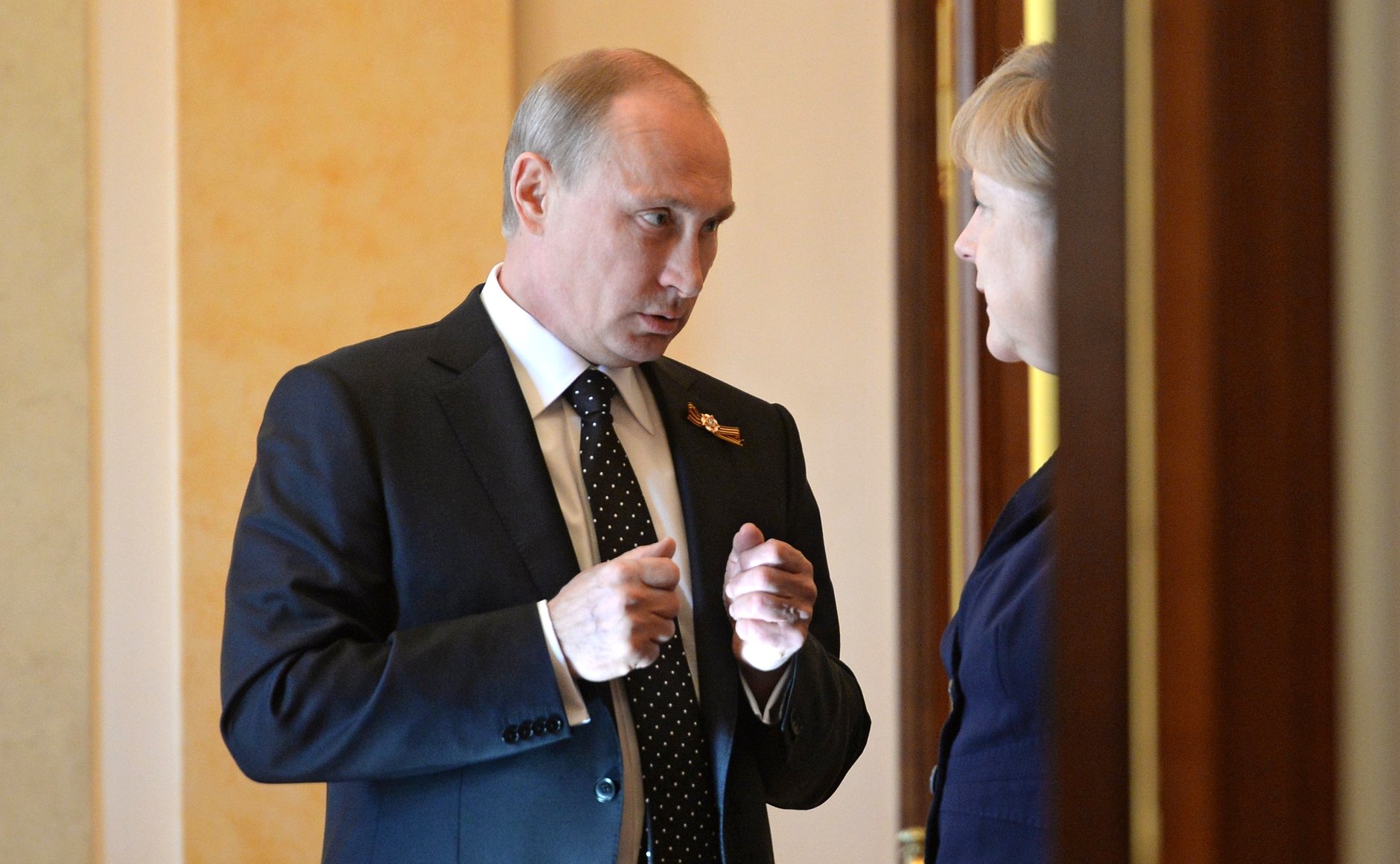
May 10, 2015: Russian President Vladimir Putin with German Chancellor Angela Merkel at the Kremlin. (Russian government)
Germany, France and Italy inter alia refused to go along with this trip-wire strategy. They don’t trust Washington, they don’t want a confrontation with Putin, and they dread the disruptive impact on their own countries of sanctions (with evident domestic political consequences). Germany’s reluctance to line up obediently behind Washington was especially frustrating.
Just after the Maidan coup and the breakaway of the two Donbass provinces (Luhansk and Donetsk), German Chancellor Angela Merkel had flown to Moscow to meet with Putin. Both were worried about the military assault being planned by newly installed Poroshenko to suppress the secession. Merkel promised that she would exert her considerable influence in Kiev in an attempt to forestall it. She reneged on that commitment, refraining to intervene, under pressure from the Obama administration and anti-Russian elements in her own coalition government.
The decisive element in her decision was a document prepared and delivered by the C.I.A. and the German intelligence service BND that the American-designed sanctions would cut the ground under the Russian economy, motivate the oligarchs to force Putin to change course on Crimea and Donbass or be dethroned. Surprise, Surprise! – Langley got it completely wrong.
That judgment assumes that the appraisal was a good-faith effort to ascertain objectively what the impact would be. More likely, the intelligence people connived with the Russophobes in Washington and Berlin to sway Merkel’s calculations toward confrontation.
They seem to have gotten it “right” in hitting upon the one argument that could get Merkel to reverse course. Truth is an irrelevancy under those circumstances. The truth has lost its a priori claim to preeminence – whether in declarations or, one suspects, often in the minds of those who purvey their subjective rendering of reality.
That pattern was repeated after the signing of the Minsk II accords in February 2015. Germany and France were joint underwriters of the plan hammered out by the Normandy four: the Ukraine leadership, representatives of the Donbass secessionists, Berlin and Paris.
Its principal provisions called for a revision of the Ukrainian constitution to give the Donbass region a high degree of autonomy, steps to secure the status of the Russian language, the holding of fresh elections and direct talks between the two Ukrainian parties to set terms of their implementation. The Kiev government, controlled (and threatened) by hardline elements, almost immediately set on a course of ignoring the accords. No official action was ever taken to execute the agreed measures. As far as Kiev has been concerned, Minsk II was null and avoid from Day Two.
Although that rejection was almost immediately evident, the two underwriters exerted no pressure whatsoever. This was despite another hurried Merkel visit to Moscow where she again reassured Putin of her full support for moving forward ratification of Minsk II. Once again she reneged.
Washington, which had been absent from the Normandy process, was furious at what they charged was a sell-out to Russia. They demanded that Merkel withdraw Germany from its role as underwriter. They threatened her with an all-out campaign to block the vital (for the German economy) Nordstrom II natural gas pipeline from Russia via severe sanctions and political agitation. Merkel caved in.
In effect, she bartered Minsk II for the natural gas from Russia. That bargain dictated German attitudes until the peaking of the fabricated crisis last year. It is a sword that Washington still holds over the Berlin government’s head.
Back to the present. To make their case to Germany, France and like-minded allies, Biden, Blinken et. al. began in October to stoke the war fever with dire predictions of an “imminent” Russian invasion. They conjured a “lightening strike,” – i.e. the sort of “cold start,” straight to the Channel, that agitated NATO planners back in the Cold War days. Bad metaphors never die, they just await the next paranoid episode.
Washington was thrown off stride when Moscow refused to play the role assigned to it. They said and did nothing to substantiate the claim. The Russophobia had taken on a life of its own that left the White House painted into a corner. The level of desperation was evinced by C.I.A. Director William Burns’ tour of European capitals with a briefcase filled with C.I.A.-generated “infallible” evidence that an invasion was in the offing – and that, therefore, the Europeans immediately should commit to the trip-wire sanctions so as to deter the in-fact, fantastical invasion.
The hottest material were satellite photographs purporting to show Russian armored units in battle formations “at the Ukrainian border” (just 180 miles away). We now know that the photographs were doctored. The tanks and other equipment were at their permanent bases adjacent to barracks and other fixed facilities. The C.I.A.’s pictures had been cropped. The C.I.A., the White House and attendant Washington agencies were trying to palm off fraudulent goods whose sophistication was worthy of a fifth-grader.
With tensions growing more acute day-by-day, the floundering Biden administration tried a brief fuite en avant via two daring telephone calls: Biden’s to Zelensky, and Blinken’s to Chinese Foreign Minister Wang Yi. Both were fraught; each exacerbated the American dilemma.
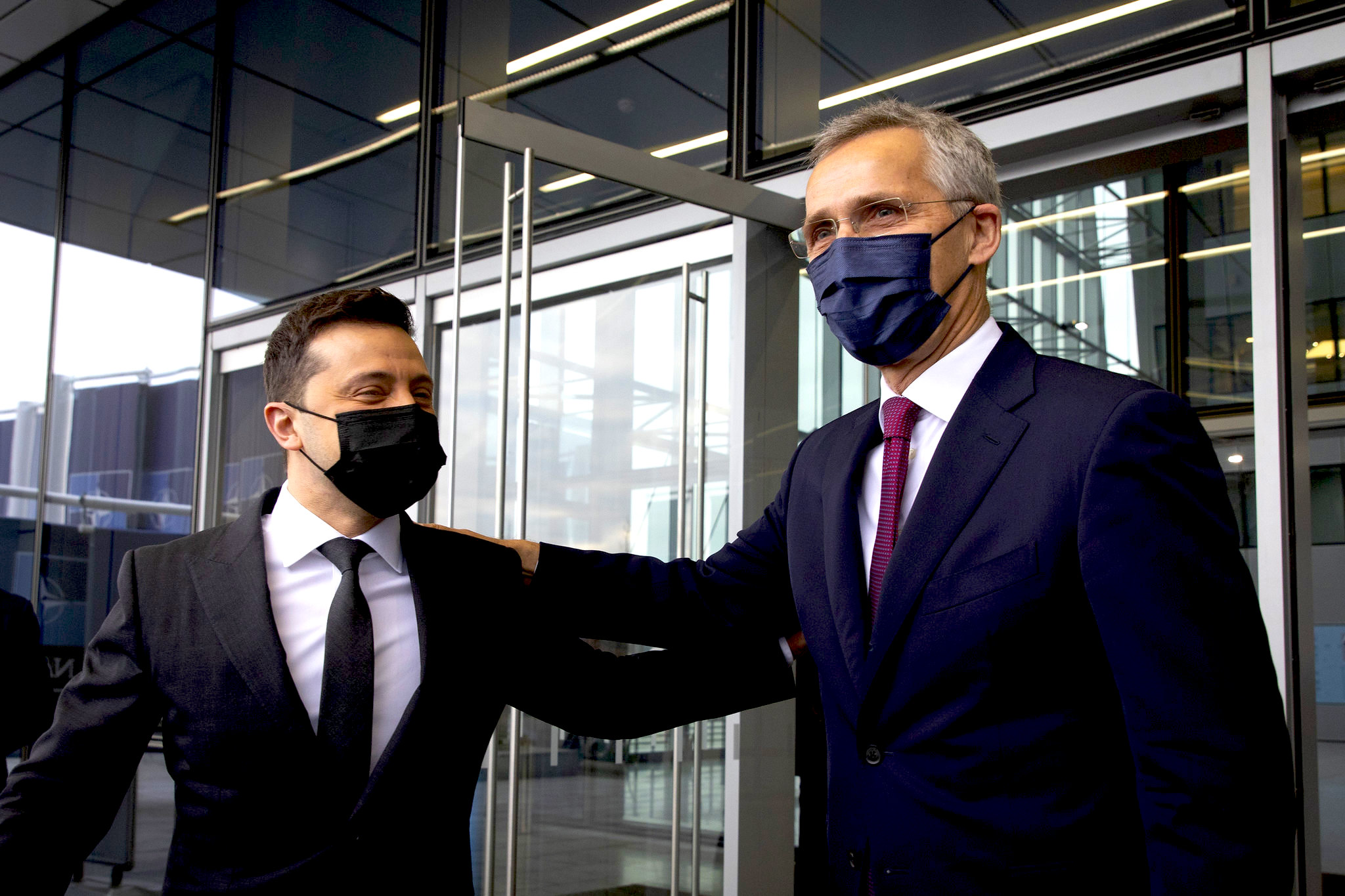
Ukraine President Volodymyr Zelenskyy, left, visiting NATO Secretary General Jens Stoltenberg at NATO headquarters in Brussels on Dec. 16, 2021. (NATO, Flickr)
The Kiev leadership had become upset by the mounting beating of the war drums from Washington fueled by claims that Russia was likely to strike soon. That assumption did not confirm with Ukrainian intelligence. Moreover, Zelensky was deeply worried by the damaging impact on Ukraine’s fragile economy. He went public with remarks distancing himself from the American portrayal of the threat and calling attention with alarm to the spreading “panic.”
Capital was fleeing the country, the currency was falling, investment deals were being suspended, and the emigration flow that already has witnessed the departure of millions of mainly young people is accelerating. Ukraine faced a tanking of the national economy. Biden vehemently rebutted Zelensky’s criticisms, bluntly reminded him what he and his colleagues owed the United States, and in raised-voice told Zelensky to straighten up and fly right. The conversation ended in a row with a resolution of the crisis further away than ever.
Highly-placed Biden officials have been quoted as saying that their patience was running out with a Zelensky who was “irritating, infuriating and unreliable.” He himself has expressed worries about a possible coup. One can imagine Nuland taking down her cookie baking tray.
(Zelensky was chaffing at having Washington pull his strings in large part because his political survival was in jeopardy. Zelensky was in a parlous position. His poll numbers were sinking, his enemies were nipping at his heels and the oligarchs were equivocating. He was so scared that he took the drastic steps of putting under house arrest the leader of the main opposition party — whose strength was among Russian speakers — and following with the issuance of an arrest warrant for Poroshenko who had jumped back into the political arena. Poroshenko fled the country.)
Blinken’s exchange with China’s foreign minister proved even more acrimonious. Washington’s supposed objective was to convince Beijing to use its influence in Moscow to persuade Putin to cancel the looming “invasion.” It also offered an occasion to sound out the Chinese as to their latest thinking about Asian-Pacific geopolitics. He took the standard American line — adding that the disruption in global economic life ensuing from a sanctions war would negatively impact China, too.
What Blinken got in return was a blast of complaint and accusation from Wang — pronounced in atypically sharp language. Wang made it clear that China fully backed Russia in every respect, blamed the U.S. for destabilizing Europe, pledged all manner of tangible support for Russia were the West to act on its threatened draconian sanctions. Wang also pointed out that the economic pain would cut deeper in Western Europe than in Russia — let alone China. The Chinese people, he declared, were prepared to bear any cost out of solidarity with their Russian partner.
Wang’s dressing down moved on to Sino-American relations. He accused Washington of pursuing an all-out anti-China strategy whose actions ran directly counter to the emollient line taken by Biden in his conversation with Chinese President Xi Jinping months earlier. On Taiwan, on the American campaign to undermine the winter Olympics, on trade issues, on the forging of mini-alliances in Asia — on all these matters, Wang denounced American ill-will toward China while warning that this was a dangerous strategy that promised a competition that the West could not win.
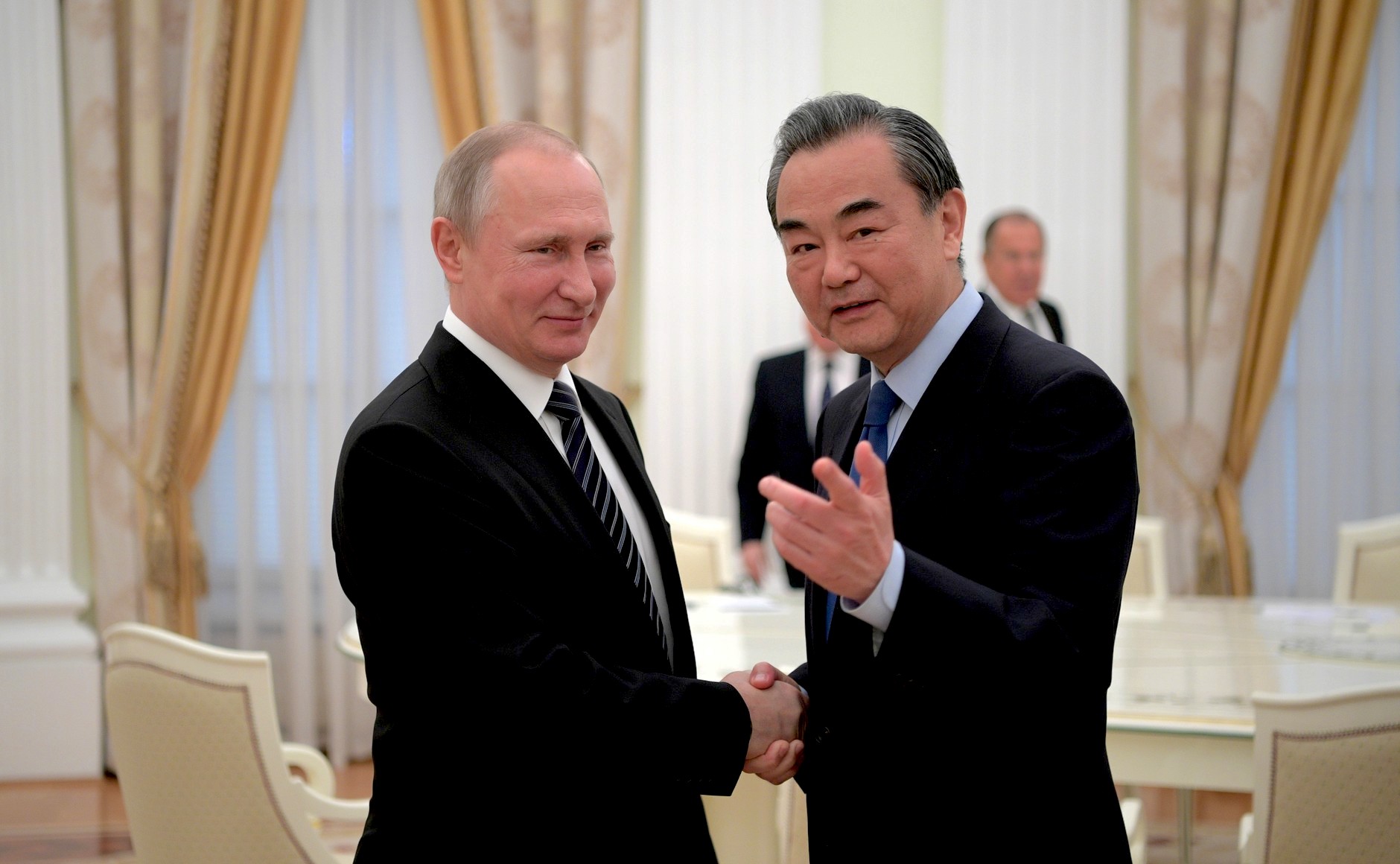
Putin and China’s Foreign Minister Wang Yi in Moscow in 2017. (President of Russia)
This angry reaction should have been foreseen. After all, the United States was asking its sworn enemy, against whom it was conducting a no-holds-barred campaign of vilification, to intercede on its behalf with America’s other main enemy who happened to be China’s close strategic partner. An extrication from a dilemma of Washington’s own assiduous making.
Its “carrot” was a reiteration that Washington didn’t want a war; its “stick” vivid reminders that severe sanctions against Russia would hurt China as well. It is frankly hard to imagine what manner of thinking lay behind this futile ploy. As remarked by Metternich when given the news that Talleyrand had died: “I wonder
what his motive was!” In this case, there is little point in looking for a logical motive. American policy-makers live in a nihilistic mental universe that encourages the indulgence of all kinds of fantasies.
Neither of these cardinal diplomatic encounters, which carry profound implications, has been reported in the Western media or given serious attention in the banal official communiques issued in Washington of the conversations. They are described in detail (with language apparently being slightly moderated) in Global Times, the unofficial English-language outlet for the Beijing leadership, and the readout provided by China’s Foreign Ministry.
This cavalier disregard for the historic geo-strategic rearrangement that has occurred in recent years is apiece with the parochial, introverted outlook of the American foreign policy establishment — still cultivating such archaic ideas as driving a wedge between Russia and China at the United States’ convenience.
Where do we go from here? God only knows. One used to say that God looked after puppies, little children and the United States of America. Let’s hope that the puppies are receiving more attentive care.
A reasonable surmise is the following. There will be no armed conflict across the contact line in the Donbass. If the local Ukrainian crazies do something reckless, the Russians will recognize its derivation and react with measured caution. There will be no massive economic sanctions.
The Biden administration will proclaim loudly that the Russian bear’s hand was stayed by the steadfast, credible threat of retaliation. Western unity was the cement. Moscow’s demands for a reconstitution of Europe’s security architecture will produce nothing tangible beyond desultory discussions until the Kremlin gets fed up; then, we’ll see what initiatives they might take.
Russophobia will remain a hallmark of the United States’ foreign policy. The Sino-Russian strategic partnership will tighten and deepen. American strategy will become progressively more disengaged from reality. U.S. leadership will remain blinkered, its thinking dogmatic, its diplomacy amateurish and accident-prone.
So it goes.
Michael Brenner is a professor of international affairs at the University of Pittsburgh. mbren@pitt.edu

What I find amazing, is it seems the whole World has become victim to Alzheimers brain disease and are unable to recall anything of the statements and claims made not so long ago.
For example, the INFAMOUS “Rebuilding America’s Defenses” – A Summary
Blueprint of the PNAC Plan for U.S. Global Hegemony, within this document American officials make it plain as day, what their ambitions are. it all boils down to, “they will never allow any nation, to replace the U.S. in its position of World hegemony.” The document spells out very clearly what their objectives are, and readers would have to be mentally challenged, to not understand its contents, how clear and precise they are written. The folks behind this document, are the very same people who started all these wars beginning with the break up of Yugoslavia.
The document can be found here: hxxps://cryptome.org/rad.htm
That “banked” fire at the beginning would’ve made a useful extended metaphor if only it were correctly identified as a “back-draft” fire, which is extremely dangerous and very similar to “blow-back,” in appearance, in reality, and most importantly, in causation. There’s a dissembling lack of acceptance involved that leads to trust even in the presence of extreme and intensifying heat that will explode with extreme violence at the slightest hint of fresh oxygen.
.
I confess to not reading the last half of this very long piece, but I scanned for any references to Nordstream II or for any to US willingness to invade and destroy Iraq, and by proxy Syria, ostensibly because of proposed pipeline routing that transits them.
.
Many causes, but who knows which meant most to the most powerful “deciders.”
I notice a trend developing here. “Trump bad very bad!”, Putin bad very bad!”
Out national security apparatus seems oddly quiet other than it’s defensive projecting.
Truth is Trump was terrible at about everything, other than yelling, Hitler style at the top of his lungs faking some emotional out pouring aimed at freeing “his people”!
Biden despite all his experience seems equally inept. Did he accept Obama’s silence on his meddling in Ukraine business in 2014 as approval of his efforts there? I see his actions since 2014 as being consistent with Trump actions that got him in trouble.
Something sure stinks. Is the Deep State’s mission to create a failed country out of the US, because it would seem to be well on track.
The Ukraine information Biden has been receiving from his intelligence reeks of B.S. and differs little from their performance under Obama and Trump.
In addition the Trump Saga churns on burning up the legislative clock while the Jan 6 Committee slogs slowly forward in their efforts to sufficiently crucify the scum bag.
In my humble opinion, given the grave condition of the American political conscience and underwhelming performance of the US congress I see nothing ahead but trouble for we pilgrims as we make our journey through life.
Much of, way too much of what Bush 41 and Bush 43 are personally responsible for has trashed the country. Obama was stymied by republicans who the democrats could have challenged had they any aptitude for hard ball politics. The democratic failure in the presidential election to gain undisputed control of Congress could well be the failure that killed democracy and the democratic party.
But what do I know?
Thanks CN
And the coffers of the Military Industrial Complex are waiting confidently.
Well said! I look to beyond 20 February, the close of the Beijing Olympics, before the clatter of dropping shoes to begin. But that may be too hasty. Patience is not only a virtue, but a sound element of strategy.
Anyone who believes that the world would necessarily be a better, more peaceful place if it were run by women need only think of Victoria Nuland for a face-slap of reality. Also Hillary Clinton, Margaret Thatcher, Indira Gandhi, Gina Haspel, Marjorie Taylor Green etc, etc… There are both good and bad women, just as there are good and bad men. Unfortunately, the bad rise to the top out of proportion to their numbers.
Excellent!
Led by the neo-cons, driven by the globalist agenda, number one U.S. goal is regime change and breakup of the Russian Federation.
Rewind to 1999. Upon succeeding Yeltsin, Putin failed to capitulate to the globalists. Overnight he became a thug, criminal, mafioso, and, gasp, a non-democrat. His worst, unforgivable sin, although an atheist himself, failure to repudiate Orthodox Christianity.
That simply cannot stand within the Beltway by those driving foreign and security policy. Putin is a roadblock and has to go.
Advancing U.S. and genuine global interests factor not at all.
“…Minsk II was null and avoid from Day Two.”
Nice turn of phrase.
completely accurate
The simple anwer to these actions are not only primiive -what else you expect from Washington – like former US president Bush jr. said “its my way or NO way!!
An excellent expose of the shenanigans of the reckless, Professor Brenner, but will anyone listen?
The Nord-2 is the most desired aim of the Ukrainian charade, it’s seldom mentioned but that’s what the American Governing elite has been trying to kill for years, succeeded only in delaying the construction of the pipeline, it’s their last chance before the project gets certified, they will do everything in the short time left to compel the Germans to scrap it, if the running N-1 were to go as well, that would be an even greater success for them, it would more than compensate for the Afghan fiasco.
Another application of Novichok perhaps, Putin blamed for it of course, could that not furnish undeniably the most powerful reason for the cancellation of the N-2, how could any democracy procure the bulk of its energy needs from such an evil country.
Let’s see. This is an election year in the US. Putin could buy extravagant Christmas gifts for Biden and his entire cabinet, pay for Zelensky’s vacation to Disneyland, deliver free gas to Ukraine and all of Europe via the NS2 pipeline and Russia would still get hit with massive economic sanctions because “meddling in American elections.” I expect nothing less, unless war comes sooner. Remember, Washington’s false narratives always trump reality.
A good insight into events that is reflective of Washington’s standard approach to what it has the unmitigated gall to call diplomacy: bark orders and issues threats to people over whom it has little authority or whom it has placed in impossible positions, expecting and demanding 100% obedience, only to find its hubris flung back in its face.
Thirty years ago, such defiance was unthinkable. China was still struggling to navigate its way up economically, and Russia was effectively ours to plunder and run as we saw fit, with drunkard Boris Yeltsin having been placed into the Russian presidency no thanks to the usual electoral interference from Langley. Now the neocons who were so convinced the American Empire was forever on top of the global game find themselves unable to process in their diseased minds that they are no longer in charge and that their little imperial project is all but dead.
If the maniacs in D.C. think their ignoring of Covid and relegation of the peasantry to forever suffering its unfettered brutality will have no effect on the health of military and intelligence personnel, they are even more delusional than I thought. Of course the military and intelligence recruitment pool will continue to diminish in both numbers and strength as the ever-spreading-and-mutating virus takes its toll on an ever-weakening population. The neocons running things are irrevocably wedded to austerity and would rather consign all life on the planet to extinction than allow even the hope for assistance from the government to people devastated by the pandemic physically, mentally, emotionally, and financially. They are looking increasingly likely to see that preference realized, and far sooner than they care to imagine. Their fantasy of escaping the planet while the rest of the species meets its end here is just that. There is no Planet B to which the elites can escape. They’re as stuck as the rest of us, but they’re too stupid and delusional to understand yet just how screwed they really are no thanks to their own hubris.
A fitting slicing of the morass, PI, the emergence of the Middle Kingdom out of hibernation, the speed and the consequences of it are still hugely unappreciated, in spite of the yapping about how threatening China is, she is still enjoying the Permanent Normal Trade Relations Partner status (PNTR), essentially because the bulk of what reaches the US from China is stuff made on behalf of the US brands, the gadgets sold by Apple are one of the examples, over two thirds of them are assembled in mainland China (the biggest of the assemblers if Foxconn headquartered in Taiwan).
How will it all end?
Excellent piece. I would only disagree with parts of the end. I don’t think that Putin will allow desultory discussions. They will act and fairly quickly. Just like with the INF and all that. Russia didn’t sit around and discuss. The developed and produced hypersonic missiles. I suspect that the Poles and the Germans will be staring down
Russian nuclear tipped missiles soon. The real problem is that the US is like a 3 year old with their finger on the button. It could, quite easily, become real ugly, real soon.
I think the Russians are smarter than that. While they seem ready to take their resistance to NATO to the next level, they also realize the damage that could be done to Russia itself…its cities…from a NATO military assault. Though they would love to resolve the issues inside Ukraine in the eastern provinces in their favor, they may well wait and simply continue to play chess with the US, NATO and the EU. It’s a long term game which in the end they can probably win without the drastic action of escalating the military option immediately.
The Ukrane debacle is just another sign that US imperialism is on a downward spiral.
Yes, simulated Russophobia and Sinophobia remain scams of US “foreign policy,” only because tyrants must create enemies to pose as defenders, accuse their moral superiors of disloyalty, and get bribes from the MIC and others.
I once considered that the US was irrationally reviving its ancient monster by reviving Russophobia, but found instead that this has always been the gambit of the scammers and scoundrels elevated to power by our unregulated market economy and corrupt political structure. They are primitive tribalist tyrants cultivated in every church and village, using the scams of tyranny evident to even the most uneducated, and considered professionalism by scoundrels everywhere.
Re “where do we go from here”, I think there are a few signs that there is some re-thinking of “Europe’s security architecture”. It is happening in Europe and Washington is blind to it, or perhaps simply arrogant enough to think that the USA is still essential to Europe’s security and political economy. (Blinkered, amateurish, and accident-prone are adjectives not out of place when speaking of Washington, as opposed to patient, far-sighted and professional when referring to Putin and Lavrov.)
I am not quite as pessimistic as Prof. Brenner that there will be only “desultory discussions” about Europe’s security architecture. I think there is leadership in Paris, Rome, and Berlin that will leave less and less of their security to drift in the winds of US incompetence and Russo-phobia. If we are really fortunate we could see the unwinding of the world’s most aggressive, belligerent, and aimless alliance called NATO.
One reason there will be no “invasion” of Ukraine is that Russia is playing a long game in which time is on their side. The longer the USA tries to stir up the new Cold War the more likely it is that global opinion will support those who are putting forth diplomatic solutions, such as draft security treaties.
Russia is playing both sides of this game.
In the past, when the USSR declared a “peace initiative” it frightened Washington because it did not
follow their narrative in which Russia must be depicted as the “bad guy” or “aggressor”. Regarding
the Ukraine, Russia can still use military means to assert its demands. More frightening to Washington
and those who have been bullied into its russophobic line they have not decided what to do if
Russia does indeed use diplomatic means.
Germane to this is the antipathy in Washington to ” bilateral trade”, which is to say trade relationships
in which the US does not participate (and control). As we all know, economic agreements (nord stream is
but one example) have proliferated recently. The result has been that other nations are not always so
enthusiastic about following the US and perhaps putting their agreements in jeopardy.
Hope you are right about the EU. Would be interesting to see an exact analysis of exacting in which ways the US keeps the EU under its boot.
My guess is if Russia’s security is not guaranteed, look for them to begin bringing troops and armaments into friendly Latin American Countries as well as a possible missile site in Cuba. What plausible reason could the US give for demanding the Russians remove those installations? US/NATO leadership has cotton between its ears.
This cavalier disregard for the historic geo-strategic rearrangement that has occurred in recent years is apiece with the parochial, introverted outlook of the American foreign policy establishment….and slavishly aped by its western vassal states and corporate state friendly media.